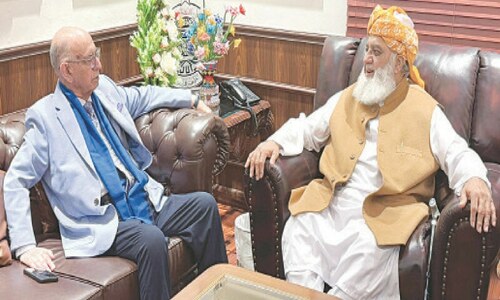NEW DELHI, July 8: Prime Minister Manmohan Singh’s government was thrown in a crisis on Tuesday after the Left Front withdrew its crucial support to the four and a half years old alliance following differences over the proposed India-US civil nuclear deal.
India needs the support of the IAEA and the Nuclear Suppliers’ Group before the deal with the United States is operationalised. It also needs China’s support, among other countries, on both counts for a meaningful progress on it. But Tuesday’s sudden developments put the focus back on the domestic vulnerability of Dr Singh.
The prime minister precipitated the looming separation with the communist group on his way to Japan and ahead of a meeting there with US President George W. Bush.
He unilaterally declared that India would go the IAEA soon. The Left Front described the statement as a fawning gesture to Mr Bush and announced the withdrawal of support by its 59 MPs to the government it had helped form in May 2004. Elections are not due till May next year but may now be brought forward.
Foreign Minister Pranab Mukherjee, struggling to manage the mess created by Dr Singh’s puzzling statement, announced a confidence vote in parliament for August 11, before which, he said, India would not approach the IAEA. He was speaking as a clutch of smaller parties appeared poised to fill the void left by the communists.
Whether the government had mustered enough numbers to pass the trust vote remained far from clear. There were widespread claims of horse-trading by parties to woo smaller groups and independent MPs.
Prime Minister Singh claimed to the Indian media in Japan that his government was stable and had a majority despite the Left Front’s decision to quit.
Officials accompanying Dr Singh said China had expressed its willingness to support the nuclear deal. The surprising claim came after the Indian prime minister met Chinese President Hu Jintao earlier on Tuesday morning in Japan where he is due to attend the G8 meeting.
Indian media also reported that China had expressed its willingness to help New Delhi in getting the nuclear deal through the IAEA and the Nuclear Suppliers’ Group. On the other hand, ironically, the entire discourse about India acquiring nuclear weapons, not unrelated to its quest for nuclear energy, centred on Delhi’s threat perceptions from China. This fear of China did the rounds frequently on TV discussions involving MPS from the Congress and the main opposition BJP, adding to the irony of seeking Beijing’s support.
There was no word from China directly though about its intentions to help India on any of the forums. On the other hand its Indian communist allies were being berated by all and sundry for being closer to Beijing than they allegedly cared for India’s own national interests.
There were no answers to a persistent query on Tuesday: Why did the prime minister who last year said he could live without the nuclear deal decide to push it at a point when the move could threaten his government. Seeking a lifeline in parliament for the nuclear deal Dr Singh swung from the Left to the Right. He made a political statement perhaps few would have expected of him.
“Bhishma Pitamah of Indian politics Atal Bihari Vajpayee should listen to his conscience and let national interest prevail upon narrow politics,” Dr Singh said in March this year, invoking the sagacity of his predecessor to bail him out. And from then on it became a personal mission for the prime minister as he initiated discussions with the Samajwadi Party inviting Amar Singh to a dinner to celebrate four years of the UPA.
The left was clearly taken aback by Tuesday’s sudden turn of events. The final straw came after the prime minister’s statement in Japan that India would go to the IAEA very soon. The Left Front said in that case the time had come to pull out of the alliance.
CPI-M general secretary Prakash Karat, announcing the withdrawal of support, said the group would meet President Pratibha Patil on Wednesday to formally pull out of the alliance.















































Dear visitor, the comments section is undergoing an overhaul and will return soon.